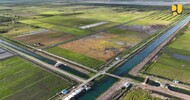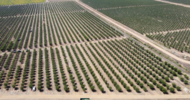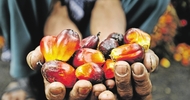The recent swell of enthusiasm for studying large-scale land acquisitions reveals something deeper about how researchers, journalists, and social activists continue to perceive societies south of the Sahara.
Loro Horta reports on recent Chinese overseas investment in agriculture in the Lusophone world
- Macau Magazine
-
11 Mar 2016
A Canadian agribusiness company, Feronia — financed by American and European Development Institutions, is involved in land grabbing, corrupt practices and human rights violations in the Democratic Republic of Congo.
- Africa is a Country
-
22 July 2015
‘Land grabs’ stands tall as a major development challenge in Africa. Millions of agriculture dependent families are forced to leave their fertile lands for multinational companies who occupy the lands for business purposes.
- Afrikan Post
-
22 July 2015
Even the World Bank admits that the vast bulk of foreign investment in Africa doesn’t help the continent’s people, with aid and agricultural support often a smokescreen for multinationals looting nations’ wealth.
It is difficult to overstate the degree to which the IMF and World Bank’s neoliberal economic policies contribute to extreme vulnerability for farmers and peasants.
What kind of role should the private sector have in the post-2015 fight against poverty and food insecurity? And how should EU governments ensure it is genuinely inclusive and responsible? Yaekob Metena explores the possibilities.
A new project maps environmental protest across the world, powerfully visualising a growing movement, building new points of convergence unite movements working on issues from food sovereignty to land-grabbing, biofuels and climate justice.
Debate over large scale land investments in Africa is shifting from the disastrous impact of land grabs to the need for African governments to deal with citizens’ outrage by developing a ‘land policy’.
- Oakland Institue
-
28 January 2015
Qatar joins a growing list of countries that includes other Gulf states, India, China and South Korea, that are not just importing food but buying the land abroad on which it is grown.
The Ethiopian government has embarked on a large-scale land investment policy that has led to the displacement and forced eviction of Ethiopia’s most marginalized traditional societies.
Briefing identifies five strategic “nexuses” to help understand how land converges with historically embedded power relations in the United States.
- Food First
-
24 October 2014
As negotiations over responsible agricultural investment policy run through the summer, Tanzanian villagers fight for the return of 20,000 acres of land lost to a failed biofuel project.
Much of the palm oil we consume comes from Indonesia, where brutal methods are deployed against locals. One of the main suppliers says it is cleaning up its act, but has it really changed?
Over the last 10 years or so, African governments have granted land concessions totalling millions of hectares to big palm oil companies and investors from Europe, the United States, and also Indonesia, India, Singapore and Malaysia.
As the spring meetings of the World Bank get under way, 180 organizations demand that the World Bank end its Doing Business rankings and its support of the rampant theft of land and resources from some of the world’s poorest people.
- Oakland Institute
-
10 April 2014
Last week representatives of communities, indigenous peoples and NGOs met in Palangka Raya, Central Kalimantan, Indonesia to discuss deforestation and the rights of forest peoples.
Where the culprits were largely governments and authoritative bodies, now multinational governments are working with these entities to take lands and deprive local communities of critical resources.
Only the Amazon and Congo basins rival Papua New Guinea for pristine tropical wilderness. But 5 million hectares of its jungle is under threat from foreign land grabs and back-door logging.
- Global Mail
-
05 February 2014
International and Honduran CSOs condemn the response of the International Finance Corporation to the highly critical findings of the Compliance Adviser/Ombudsman regarding the IFC’s investment in Corporación Dinant in Honduras
As investment deals between big business and the government are made across Tanzania, those working on behalf of small-scale farmers argue that more needs to be done to ensure their needs are not overlooked.
The Kenya Flower Council foresees huge implications for the country when Karuturi goes down, reports Flora Culture International
- Flora Culture International
-
18 December 2013
“Buyers are interested in large surfaces located in a single region with as high a consolidation level as possible, with access to the water supply and irrigation infrastructure"
Under the initiative of the Indian Ocean Commission, Madagascar is the focus of a large project to produce and export agricultural products to ensure the food security of this regional space, raising the spectre of land grabbing.
Of the countries that lost the highest percentages of their cultivated land to land grabs, nine out of 10 have malnourishment rates of 5 percent or more.
- Mother Jones
-
06 February 2013
"If the populace objects, we will not develop the land," says Sime Darby
- Sime Darby
-
14 December 2012
Lessons need to be learned to transform Africa's ‘resource curse’ into a ‘resource blessing’ and to mitigate against the negative impacts of large land-based investments.
An organisation called Congo Agriculture, affiliated to South African farmers union Agri SA, had been established to facilitate and drive the process of setting up South African farmers in the Congo.
- HowWeMadeItInAfrica
-
26 October 2012
BFS has a land bank of 220,000 hectares under a Protocol d’Accord from the government of the Republic of Guinea
- Farm Lands of Africa
-
07 August 2012
Villagers in Mozambique are caught between their government's need to promote agricultural development through foreign investment and to protect the rights of the citizens who depend on that land.















